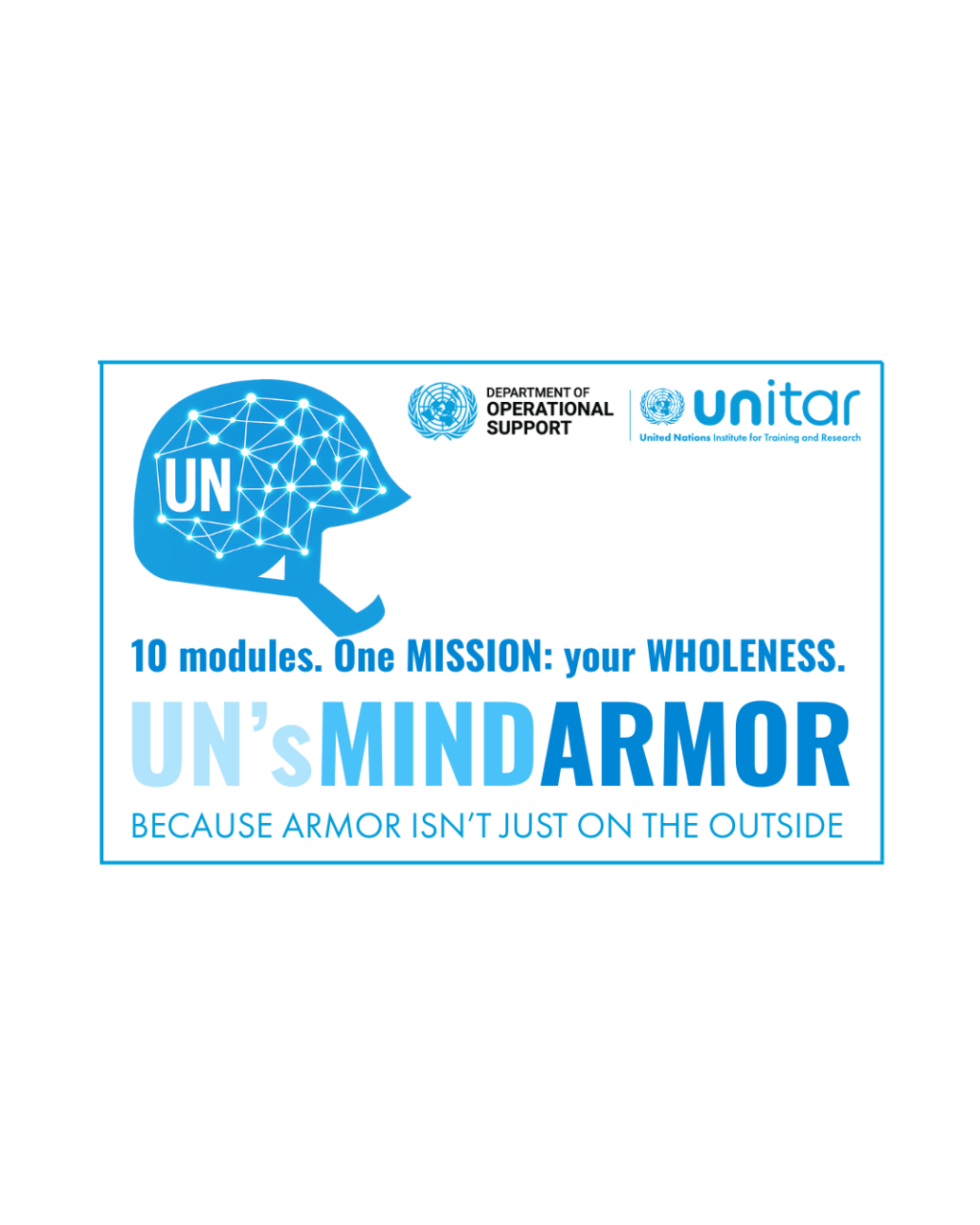
UN’s MindArmor
Division of Healthcare Management and Occupational Safety and Health (DHMOSH) of the United Nations Department of Operational Su
Mental health is a critical component of the overall readiness and effectiveness of United Nations uniformed personnel deployed in peacekeeping operations. The unique challenges of mission environments - including exposure to violence, separation from family, high operational demands, and resource constraints - place personnel at increased risk of stress, trauma, and other psychological difficulties. Addressing these challenges is essential not only for the well-being of individuals but also for the cohesion, resilience, and operational success of peacekeeping teams.
This e-learning course has been developed to strengthen awareness, understanding, and practical skills related to mental health. It equips personnel with knowledge and tools to foster supportive environments, reduce stigma, and address mental health challenges effectively within mission contexts. The course builds on international best practices while tailoring content to the realities of peacekeeping operations.
This is an online, self-paced course. By the end of this course, participants will be able to:
- Recognise the impact of stigma, stress, trauma, grief, sleep, alcohol use, and mental health disorders on personnel well-being and mission readiness.
- Apply effective communication, listening, and peer-support strategies to promote a stigma-free and supportive environment.
- Identify early warning signs of mental health concerns, including suicide risk, and know how to respond with empathy and appropriate referral.
- Practice personal strategies for maintaining resilience, managing stress, and supporting mental health in high-pressure environments.
- Demonstrate leadership behaviours that foster psychological safety, team cohesion, and long-term resilience in mission contexts.
The course is composed of ten modules, each addressing a critical dimension of mental health in peacekeeping missions:
- Understanding and addressing stigma in mental health – Types, impacts, and strategies to reduce stigma.
- Effective communication and mental health – Core listening skills and handling difficult conversations.
- Sleep and mental health – Sleep challenges in missions and strategies for healthy habits.
- Alcohol and mental health – Risks of alcohol misuse, recognition, and supportive interventions.
- Mood and anxiety disorders – Identification, personal coping techniques, and team/leadership support.
- Grief and mourning – Managing grief personally and collectively, with cultural sensitivity.
- Managing stress – Strategies at personal, team, and organisational levels.
- Understanding trauma and supporting recovery – Stress responses, PTSD, and trauma-informed leadership.
- Protecting minds, saving lives – Suicide awareness, intervention, and prevention strategies.
- Fostering resilience – Building resilience at the personal, team, and organisational levels.
Each module is divided into 1–3 lessons and includes interactive elements, self-reflection opportunities, and key takeaways for practical application.
The course adopts an interactive, learner-centered e-learning methodology that combines knowledge acquisition with reflective practice. Key features include:
- Scenario-based learning: Fictional but realistic mission examples to contextualise mental health challenges and stimulate reflection.
- Modular structure: Ten self-paced modules allowing flexibility while ensuring comprehensive coverage of key themes.
- Interactive activities: Lessons with quizzes, reflection prompts, and knowledge checks to reinforce learning.
- Practical focus: Strategies and tools directly applicable to mission settings, encouraging learners to connect theory with practice.
- Inclusive design: Content developed with attention to accessibility, gender sensitivity, and cultural diversity.
The course is designed for:
- Uniformed personnel deployed in United Nations peacekeeping missions, including members of the military, police, and formed police units.
- Leaders and supervisors within mission settings who play a critical role in shaping supportive team environments.
- Civilian staff working closely with uniformed personnel, who may benefit from increased awareness of mental health in mission contexts.
The course is particularly relevant for those preparing for deployment, currently serving in missions, or transitioning back from peacekeeping duties. No prior expertise in mental health is required; the course is intended to build foundational knowledge and practical skills accessible to all.

